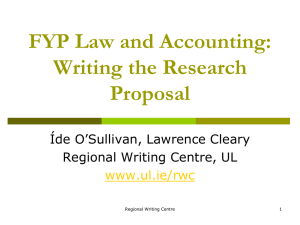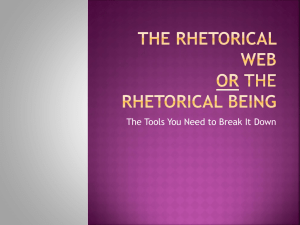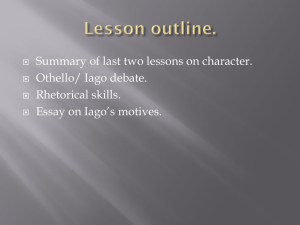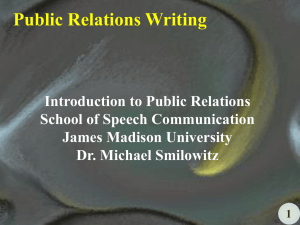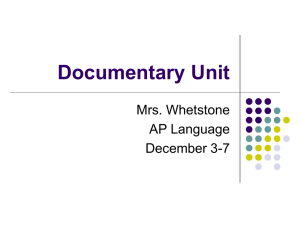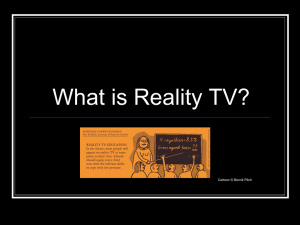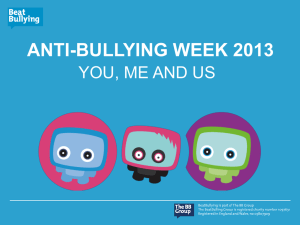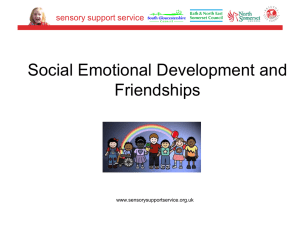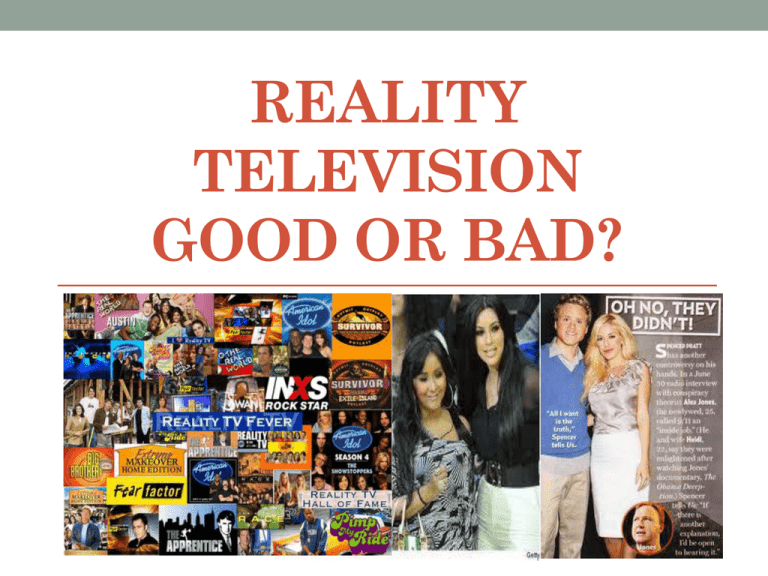
REALITY
TELEVISION
GOOD OR BAD?
Achievement Standard 1.5
• Worth 3 credits
• You are writing a persuasive article to be published in
a book that will explain young people’s views to an
adult audience.
• Your piece of writing should be at least 350 words.
• Your article should clearly present your opinion about
the topic.
• You may argue one side of a topic or you may present
arguments for both sides.
Where do we see formal writing?
• Newspapers articles
• Film/Novel reviews
• Literary pieces
• Literary responses
• Letter Writing
• Opinion Pieces
Purpose of Formal Writing
To inform, persuade and communicate
with a variety of different audiences.
This can be done in many different
types of mediums e.g. Newspapers,
Magazines, Books, Internet etc.
FORMAL WRITING GUIDELINES
• No Abbreviations Write out words like New Zealand,
•
•
•
•
television, and Presentation. Always write out the word
"and"; do not use symbols like "+" or "&."
No Slang Don't use slang like "guys," "I like, really, don’t
think so," "cops," "flunked," "he was really cool," etc.
No etc. Don't use "etc." in your formal writing. If there is
more to say, you need to say it, not allude to it through the
use of "etc."
No Contractions Write out "he is" not "he's"; write out
"who is," not "who's"; write out "do not," not "don't"; etc.
No Extra Words Avoid extra words like "well," "anyway," or
"you know" that have no meaning. Don't write "I think" or
"in my opinion"; because this is your writing, the point of
view is clearly yours.
FORMAL WRITING GUIDELINES
• Avoid First or Second Person In a formal paper, only third
person is acceptable: he she, it they, and related forms (one, the
reader, etc.). Don't use first (we, I, me, my, us, our, etc.) or
second (you, your, yours) person unless approved by the teacher.
• Write Out Numbers Spell out numbers: "six" not '"6"; twentythree" not "23." Dates and long numbers may be written
numerically: 1997, 1845, 1,234,890.
• Titles: Underline titles of major works or place them in italics:
novels, plays, movies, etc. Short works (short stories, poems, etc.)
should be in quotation marks.
• Proofread Check your paper for typing,
spelling, and grammatical errors.
• Quotations NEVER copy an author's words without using
quotations and crediting the source.
Layout of a formal essay
• Introduction
• Paragraph 1
• Paragraph 2
• Paragraph 3
• Conclusion
Introduction
It needs to state your argument or
topic, introduce your main points
Grab the audience’s attention
(rhetorical questions, surprising
statistic)
Make the reader want to carry on
reading your essay.
Body
This is the most important part!! It includes
your ideas mentioned in your introduction.
Aim for three ideas with each being explained
in a new paragraph. Start with the strongest
point and place your weakest point in the 2nd
paragraph.
Use SEXY for each of your ideas. For the Your
Opinion part – avoid using the words “I believe”.
. Instead use phrases like: “This highlights” or
“This proves” or “In order for society”. Or
even place a suggestion or rhetorical question.
Conclusion
This is the last part of your essay and
should leave the reader to think about
what they have just read.
Restate the main points of your essay,
reinforce your attitude without
introducing any new information and
give a strong thought provoking
statement or rhetorical question.
Videos
Why is Reality TV so popular?
• http://www.youtube.com/watch?v=QAnAoM96wxE
• Reality TV is Not the Real World
http://www.youtube.com/watch?v=PJA27h6ETc&feature=related
History of Reality Television
• Reality TV as we know it began back in
1992 when MTV first broadcast The
Real World.
• It was an experimental show
• 7 people from different backgrounds
• Live together for several months and
have their interactions filmed.
• It wasn't even known as reality TV
back then, more so as a documentary.
http://www.reality-tv-online.com/articles/history-reality-tv.html
Survivor
• It was in 2002 when CBS's
blockbuster hit called
Survivor finally gave reality tv a
name.
• A cast of regular people were
exiled to a desert island to
survive and undermine each
other to win the Grand prize of
one million dollars.
• Elizabeth Hasslebeck is now a
famous star in her own right
thanks to Survivor
The negative changes
• Another way reality tv has changed is that it is
much more graphic now.
• In the first season of The Real World, it was real
people living together.
• Now it has become seven people who are acting as
they think they should based on the past sixteen
seasons.
• Sex has become rampant since the Las Vegas season
and roommate hookups, something only thought of
the first few seasons, is now common place.
IN OTHER WORDS –
THE MORE DRAMA
THE BETTER
PEOPLE SIMPLY BECAME
OVERWHELMED AND BORED WITH
TV, SO THEY CONSTANTLY
REINVENT THE GENRE
The good
• Trista and Ryan
from The
Bachelor
• Found love for
one another
• Now they are
married and have
a child
• ABC paid for
their million
dollar wedding
The good and the bad
• The Kardashian Family now
earn millions of dollars
through their reality show
and their endorsement
deals.
• They find it difficult to film
their series because of the
cult following they have
occurred.
• Should Baby Mason be
filmed? What are his right?
• Do they value their privacy?
The bad
• People love to
stereotype humans ,
here are just a few
examples.
• Omarosa from the
Apprentice, America
hated her.
• Is it okay to publicize
negative behaviour?
Eg Nicole “Snookis”
drunken arrest?
The Sad
• Jade Goodie’s life was enriched
financially, once she had appeared in
Big Brother
• She was foul-mouthed to the point of
bullying. The producers had
introduced her for ratings – and it
worked.
• The end result shamed her, and the
nation, with accusations of racism and
bullying.
• Her star began to fade but the
outpouring of public goodwill, once it
was clear that she wouldn’t survive
the cancer, was amazing.
The Ugly
• Susan Boyle
• Found international acclaim
as a singer
• Pressure to conform to the
industry’s expectations
• Following the shows finale,
she suffered a mental
break down
• Does money buy happiness?
Media Effects
• Some critics believe that audiences take in without question, and are influenced
by anything, that the media throws at them. They describe the audience as
passive. This is sometimes known as ‘the effects model’ or ‘the hypodermic
syringe theory.’
• People who believe in the effects model often assume that:
people (and society) will be ‘dumbed down’ by watching
reality TV
audiences may be influenced by the ideas and values in
some reality shows (e.g. celebrity, getting something for
nothing, putting other people down, etc)
certain types of viewers – e.g. teenagers, lower social
grades, the less educated – are more vulnerable to such
influences. Reality TV is often said to inspire crime cases,
‘copycat’, anti-social or passive behaviour.
Satisfying Our Needs
• The ‘Four Needs’ (or ‘Uses and Gratifications’) theory by Blumler and
Katz suggests that audiences use the media in four different ways.
• Entertainment and diversion: to find personal pleasure and
enjoyment; emotional release from everyday life and its
problems.
• Surveillance and information: to learn about the world, new
experiences, other people; to satisfy curiosity; acquire new
knowledge.
• Personal relationships: to enhance and explore relationships
with other people, find companionship or substitute
friendships on screen.
• Personal identity: to find support and reinforcement for one’s
values and beliefs; to help understand oneself; to help
explore one own identity.
• How far might these explain the popularity of reality TV with audiences?
How do Audiences Watch?
Different ‘Readings’ of a Reality Show
• Some people find The X Factor offensive or tedious, others find it riveting;
some find CBB fascinating, others find it idiotic. How you respond depends on
who you are, your background, age, attitudes and values.
• Some critics identify 3 main ways in which viewers react to – or ‘read’ – a
text.
• The preferred reading (the way the producers want you to see it)
The X Factor is great family entertainment and full of lovely Cheryl Cole and talent.
• The negotiated reading
The X Factor is OK but only for older, undiscriminating, couch potatoes.
• The oppositional reading (opposed to the way the producers want you to see it)
The X Factor is offensive and degrading to contestants, is destroying the music industry, and
undermines originality and creativity.
• How do you read The X Factor?
Scheduling
Targeting
the
Audience
• ‘stripping’ a programme at the same time daily over a week
• finding the right time-slot for the target audience's needs;
• running repeats, extras, special events
• personalising with online and on-demand downloads
Interactivity (the latest buzzword – what every producer wants to
achieve)
• phone-ins, votes, competitions, web-based forums, chat-rooms, social
network groups, text-message updates etc.
Synergy
• keeping you interested through cross-media promotions –
merchandising, websites, presenters/participants on TV and radio
talk-shows, photo-opportunities and PR stories in the press, lifestyle
and celeb magazines and so on.
• Which methods work for you?
Group Activity- Reality Bites
• Get into groups of 4-5 and complete the
following hand out.
• You will have 15minutes to complete the task.
• Be prepared to share and justify your
answers
•
These questions will help you to formulate your point of view when it
comes time to write.
Positives and Negatives
As a class we are going to
brainstorm as many positive and
negatives of Reality Television.
Try to think of specific examples,
to help back up your argument
Split your page into 2 halves and
rule up your page.
Editing: How many mistakes can you find?
Anthony Visits Nick
On sunday, Anthony went over to Nicks house to play
basketball. They played a gam of one-on-one. Anthony
made six baskets, bute nick made eight Nick was the
winner.
After the game, both boys whent in side to have some
snack’s and watch television.
Editing: How many mistakes can you find?
Miniature Golf
Phil Matthew, and Andrew played miniature golf. On the
first hole, Phil got a hole-in-one! At another hole,
Matthew's Ball went into the water The best golfur of
the day was Andrew who finished with a score of 28.
Everyone had a grate tim
10 Types of Reality Shows
1.Talk Shows
2.Game Shows
3.Celebrity Shows - these include celebrity documentary
style shows like Keeping Up With the Kardashians and Kathy
Griffin: Life on the D List, as well as celeb based dating
shows like Flavor of Love and Rock of Love
4.Fly on the Wall Shows - these include shows like Big
Brother, whose premise is simply throwing people into a
unique living situation and filming the results
5.Dating Shows - these include single episode dating shows
like Fifth Wheel as well as dating shows that depict a search
for a partner over several episodes, like The
Bachelor and The Bachelorette
6.Competition Shows - these shows are different from game
shows in that they span several episodes and include things
like Survivor and The Amazing Race
10 Types of Reality Shows
7.Job Based Shows - these programs have a competition
component but the prize and the challenges are all based
around a particular career. Think of The Apprentice, Top
Chef and Project Runway
8.Hoax Based Shows - hoax based reality shows feature the
manipulation of either all of the participants or some of the
participants. This includes shows like My Big Fat Obnoxious
Fiancée and Joe Millionaire
9. Hidden Camera Shows - Hidden camera shows are in the
style of Candid Camera and Punk'd
10. Talent Shows - these are among the most popular reality
shows and include things like American Idol and America's
Got Talent
Could you be a reality Star?
Producers look for people who are:
Opinionated and outspoken and
Display outrageous behaviour while being
Attention seekers and sometimes be
Aggressive towards other
Then they mix these crazy cats with:
Shy, quiet and seemingly “normal” people
PLUS more opinionated and aggressive people to
create
How real is it?
• Generally there are hundreds of hours worth of
footage , cut and edited to make an episode which is
generally between 22 to 48 minutes long!
• Scenes are reshoot.
• Hair, make up and stylists to help them get ready for
the day.
• Ads promoting the show use voice clips to misconstrue
what really happens in a episode.
Mark Schedule
Achievement
Achievement with Achievement with
Merit
Excellence
Develop and structure
ideas in formal writing.
Develop and structure
ideas convincingly in
formal writing.
Develop and structure
ideas effectively in
formal writing.
Use language features
appropriate to audience
and purpose in formal
writing.
Use language features
appropriate to audience
and purpose with
control in formal
writing.
Use language features
appropriate to audience
and purpose with
control to command
attention in formal
writing.
Language features:
• Personal Pronouns
• Statistics
• Rhetorical Questions
• Triple construction
• Repetition
• Incomplete sentences
• Vary your sentence lengths
Do it now!
• Get out the assessment hand out from Tuesday.
• Read the merit and achieved exemplars.
Underline language techniques of both exemplars as you
read:
• Personal Pronouns
• Statistics/ Examples
• Rhetorical Questions
• Triple construction
• Repetition
• Incomplete sentences
Activity
• You are going to rewrite the introduction of
the Bullying Article (Not Achieved exemplar).
• You are going to rewrite it from the negative
point of view. Make sure you include a
convincing 3 reasons why bullying is negative.
• Be prepared to share your intro with the class
Introduction- Enticing your
readers to want to carry on reading
• A strong opening: This will command your readers’
attention from the start. Imagine your reader is
asking “Why should I care?”
• A clearly stated opinion: Your case should be clearly
and strongly stated so that it is easy for readers to
understand your point of view.
• State your 3 main points
Example
Bullying is an issue we all need fight together.
Imagine seeing a punch being delivered to one of your
fellow classmates. That person falls to the ground. They
hit the ground. They die. All whilst other students are
filming this fight with their cell phones. Every year
more and more students are being bullied and the
footage is being uploaded to YouTube. Bullying is a
reality for every school in New Zealand and with the
advances in social media and technology, bullying is
increasing throughout our country.
Paragraphs
Statement- which states your main point.
Explanation – Explain your point of view and the
reasons behind it. You need to be convincing so the
more explanation the better.
Example- Use specific statistics, examples and
quotes.
Opinion- avoid using the words “I believe”. .
Instead use phrases like: “This highlights” or
“This proves” or “In order for society”. Or even
place a suggestion or rhetorical question.
Conclusion
• Re-state your opinion and your three
points. Finish off on a strong point.
Try using language features:
• Personal Pronouns
• Statistcs
• Rhetorical Questions
• Triple construction
• Repetition
• Incomplete sentences
• Vary your sentence lenghts
Proofreading
strengthen your opening to command attention
replace informal words or phrases with words more appropriate for
formal writing
improve the flow of your sentences
vary the way your sentences start
improve the links between ideas
add more supporting evidence
add explanations to link your evidence to your ideas.
Proofing means that you should check your work carefully for errors.
Here is a list of some common problems in student writing:
missing punctuation (for example, full stops, commas, apostrophes,
speech marks)
missing or misused capital letters
incomplete or incorrect sentences
incorrect paragraphing
misspelt words
mixed-up tenses
Formal Writing Checklist
Check for missing punctuation(for
example, full stops, commas,
apostrophes, speech marks)
Capital letters for names, places.
All words need to be spelt in full e.g
Television
All
titles of TV shows needs to be
italics.
Print your work off and read out loud
to help you find the errors

